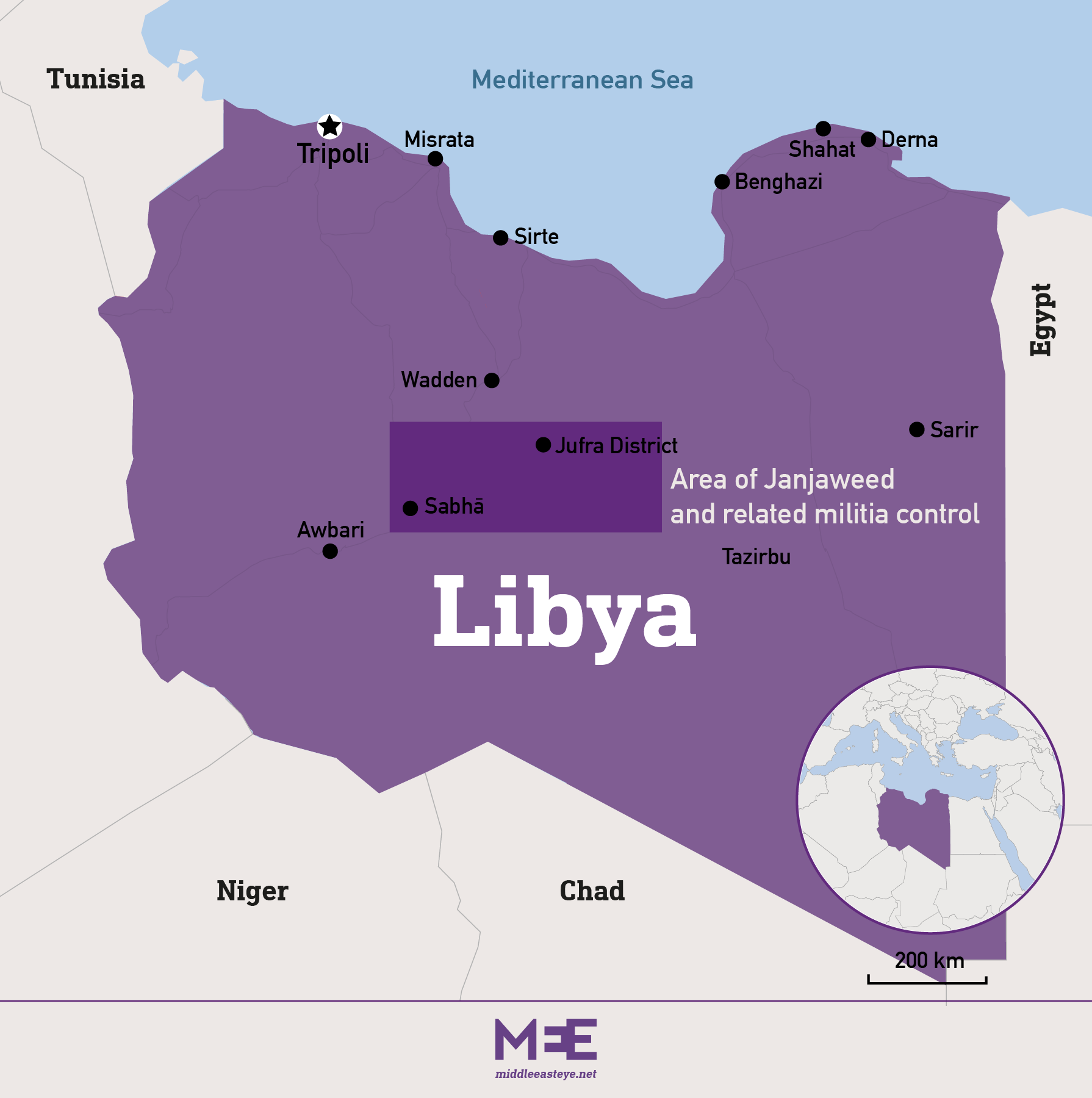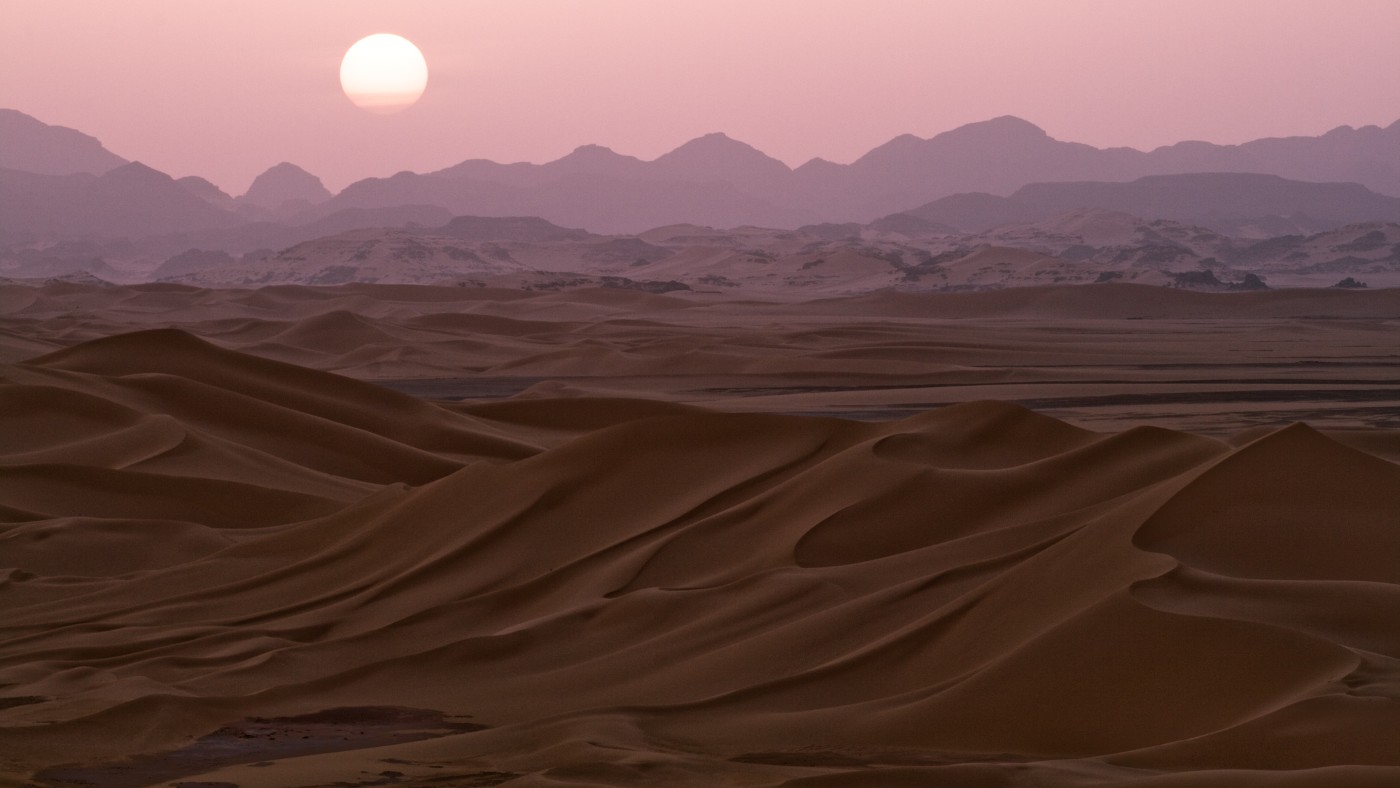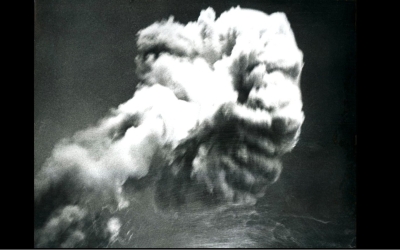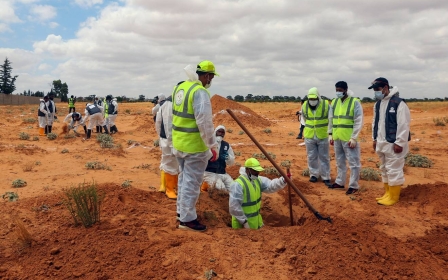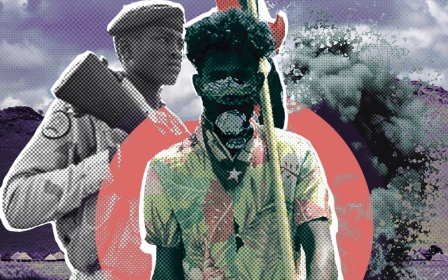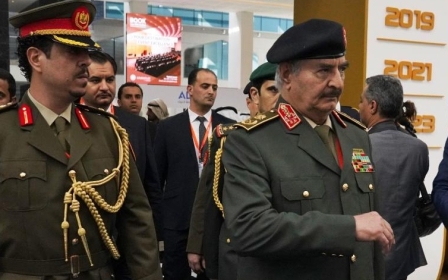The armed militias bringing terror and turmoil to Libya's desert south
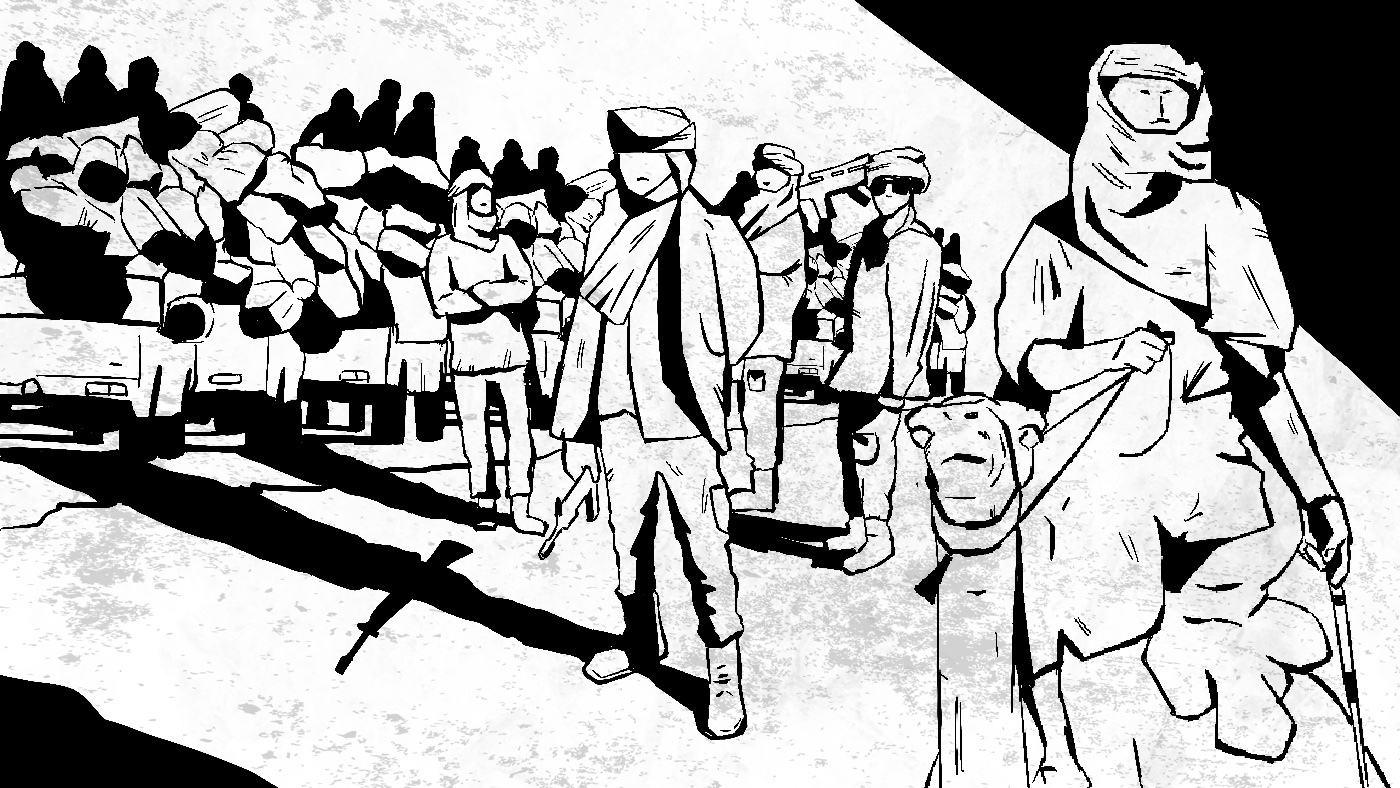
Summer had arrived, and with it the merciless heat of the desert. In Fezzan, the largely desert region of southwestern Libya, it was time for shepherds who had grazed their sheep in the wild through the spring to move their herds on.
It was June 2017 and two of those shepherds, Mohammed al-Zarooq, 64, and his friend Abdullah, 65, decided they would make their journey at night, going north through the Haruj mountains of central Libya.
Zarooq led the way in his vehicle, with Abdullah following. The two men were nearing the village al-Fuqaha, travelling through the stony desert paths of the mountainous, volcanic land. Abdullah was lagging behind, so Zarooq, who is from the village of Az Zighan, near the southwestern Libyan city of Sabha, passed over a stretch of land allocated for grazing animals and stopped to wait for his friend.
“I didn’t realise I had escaped from a terrifying trap,” he told Middle East Eye. “My friend was intercepted by an armed gang. They shot at him. One of them hit him over the head with the butt of his gun. They could only take what he had. Why did they do it? We are defenceless shepherds.”
The next summer, in June 2018, Muftah went through a similar ordeal. A Libyan truck driver, Muftah told MEE about the kidnap and murder of his friends Aseel and Abdel Salam. A gang waiting for passers-by grabbed both men and pushed them into a car, shooting Aseel in the wrist because he was slow in complying with their wishes.
New MEE newsletter: Jerusalem Dispatch
Sign up to get the latest insights and analysis on Israel-Palestine, alongside Turkey Unpacked and other MEE newsletters
They were driven south into the depths of the Sahara, across the dirt road that links the towns of Fuqaha and Tamsah.
“At a rocky, hard-to-reach area, close to the palm forest, they took us hostage, and that’s when the real torment began,” Muftah said. “They beat us morning and evening, asking us to contact our families and tell them they needed to pay them 1.3m dinars [around $272,000] in three days. They threatened to kill us if we were late or if we procrastinated.”
The torture sessions were sadistic and punishing, Muftah said. The armed gang members spoke “the language of the people of Chad” and severely beat his other friend, Abdel Salam, who told them: “We are not people of money and wealth. How can we pay you this money when we are unable to make a living for a day?”
'I told the driver: don’t stop. Indeed, he did not stop, and so they shot at us'
- Ibrahim, kidnap victim
Muftah told MEE that after he and his friends tried to resist the beatings and torture, one of the militia members jumped onto Salam’s handcuffed body and started “gargling dirt in his mouth”. When the militia man got off Salam, the shepherd started coughing violently. “He felt a sharp shiver and his pulse stopped immediately,” Muftah told MEE.
The armed gang then forced the Libyans to bury their friend and lead the prayers over his body. Two of the kidnappers joined the prayer for the deceased. The group spent 22 days as hostages in the heat of the desert. One of them was a child, the rest were truck drivers. Like Abdel Salam, Aseel did not survive the ordeal.
The devils on horseback
Local witnesses and survivors of these and many other similar armed attacks and hold-ups have told MEE that the perpetrators are not simply opportunistic criminals.
They say - and there is evidence to support them - that the armed groups are linked to the Janjaweed, the infamous Arab militias whose origins lie in the 1980s in Chad, and who then came to prominence in the first decade of the 21st century in Darfur.
There, in western Sudan, the Janjaweed were tasked by the Sudanese administration of autocrat Omar Hassan al-Bashir with the violent repression of black African tribes who rose up against the government. The Janjaweed - some translate the name as “devils on horseback” - went on to be accused of widespread atrocities in the region.
Some Janjaweed fighters and leaders came to form the Rapid Support Forces (RSF), now Sudan’s most powerful militia. Its leader, Mohamed Hamdan Dagalo, known as Hemeti, is the country’s de facto deputy leader. RSF fighters can now be found as far west as Mali and as far east as Yemen.
In Libya, UN experts say Sudanese militias fought on both sides of the 2014-2020 war between the internationally recognised government and the forces of eastern commander Khalifa Haftar. Sudan shares a 330km-long border with southeastern Libya.
Haftar, with the help of Sudanese militias, captured key bases at Tamanhint and Jufra in June 2017, north of the city of Sabha, which lies along one of the main smuggling and transit routes for refugees coming from the African continent to Europe. The area was the scene of fierce fighting between the two sides and government forces, backed by Turkey, withdrew.
Locals and survivors of attacks in southern Libya told MEE that one fallout from this was that Janjaweed militias came to control an estimated 300km stretch of territory from Sabha to Jufra, in central Libya.
"We have monitored many infiltrations and violations committed by the Janjaweed groups stationed in the Sukna area," an official spokesperson for the regional operations in Sirte and Jufra said. "We have recorded more than one attack on the homes of citizens and their private farms, in addition to armed robbery on the headquarters of public agencies."
The militias' grip has weakened recently as fighters have drifted across Libya’s southern borders into Chad, Niger and Sudan, but some remain. Looting, theft, killing, smuggling of refugees and human trafficking are still undertaken by these gangs in the border areas of all three countries and Libya, as confirmed by Human Rights Watch and the International Global Report on Trafficking.
Into the desert
Ibrahim and his wife had travelled to Misrata, on Libya’s northwest coast, to get lifesaving surgery for their four-month-old son. The surgery went well and the young family rented a taxi to take the long journey south back to Sabha.
Mindful of the increase in gang-related attacks, Ibrahim suggested that the driver take a longer route home. The driver did not agree, and because Ibrahim had a limited amount of money, he relented, handing the fare to his wife.
“We crossed the al-Sawda hills, and at the end of the land of al-Qaf we were surprised by a gang blocking the road with stones and asking us to stop,” Ibrahim said. “I told the driver: don’t stop. Indeed, he did not stop, and so they shot at us. The car’s windshield was shattered and my child was hit in the head with some shrapnel. My wife was also hurt.”
Despite the damage to the car’s tyres and engine, the group managed to get away. After 20kms, they left the car and headed into the desert on foot, looking to finally shake off the armed gang. They walked for 40kms, but Ibrahim’s wife was cold, thirsty and worn down by fatigue. Her feet bled. It was winter, and winter in Fezzan can be extreme.
Ibrahim tried to give his wife hope by saying that they were nearly at their destination, that rest was just around the corner. They reached a main road and began to wait for a friendly passing car. Three passed but the group did not dare stop them, for fear they be armed gangs.
“After a while, the light of another passing car appeared,” Ibrahim said. “It was a small Hyundai Sonata. When I felt the sound of the wheels I knew it was a small car. I moved closer to the road. My wife could not bear it any more. I approached the car. They were our saviours.”
Killing a professor, killing a journalist
The gangs have not spared anyone. Middle East Eye has heard about hostages being chained up, about poverty-stricken people having everything taken from them, and all manner of torture.
Hamed Ali Mayouf, a professor of chemistry at Sabha University, was killed in front of his children by rogue gangs that practise kidnapping and robbery on the road.
Musa Abdul Kareem was a journalist who covered the effects of the Libyan conflict on daily life in his city, Sabha. He had been able to communicate with a militia leader as part of an investigation published by Fasanea, the local newspaper where he worked. The article carried a statement by the leader under a pseudonym, through his deputy.
Abdul Kareem was abducted on the morning of 31 July 2018 by armed, masked men travelling in two civilian vehicles. Hours later, his dead body was discovered, blindfolded and hands bound, near the Sabha Health Institute. It had 13 bullet wounds and bore signs of torture.
His newspaper’s obituary read: “The forest is open. We have lost our colleague and brother. His life was a price for his courage, professionalism, and honesty. Musa lived longer than those who failed him.”
Local response
Local resistance to the militias has come against the odds. Hun, an oasis town in the north of Fezzan, witnessed protests following the killing of local citizen Abdullah Abu Qusaisa, whose dead body was thrown onto the road in an industrial neighbourhood.
Residents have been able to chase away some kidnapping and robbery gangs and have been able to liberate family members.
Leaflets targeting the Janjaweed and Wagner Group mercenaries were distributed in the region. The two groups have fought alongside each other in alliance with Haftar, who is close to Russia. An estimated 1,000 Wagner fighters are still deployed in Libya.
"Warning and threat directed at mercenaries of Wagner and Janjaweed and those who support them," the citizen-distributed leaflet read. "All of your locations, movements, positions, and points of presence are being monitored and under surveillance by the people of the city.
"Preparation is underway to target you. Therefore, you are requested to immediately leave the city, as you have no place or shelter due to the killing, destruction, theft, and moral corruption you have committed in a society that rejects you in entirety and detail."
For Muftah, Ibrahim and the families of those killed by the armed gangs that have thrived in the darkness of Libya's endless conflict, the impact of the past few years can seem far starker.
A stone-laden road, a barren wasteland with no sign of life. A desert stretching across the horizon. The memory of kidnappings and killings and the fear of more to come. This is the legacy of the militia's reign of terror in Libya.
This article is available in French on Middle East Eye French edition.
Middle East Eye delivers independent and unrivalled coverage and analysis of the Middle East, North Africa and beyond. To learn more about republishing this content and the associated fees, please fill out this form. More about MEE can be found here.


